Lee Harmon's Blog, page 131
April 25, 2011
Book review: The Path of a Christian Witch
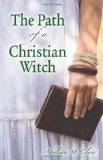
 by Adelina St. Clair
by Adelina St. Clair★★★★
Joyce called me to the center of the circle. I walked up to her, my heart pounding in my chest. Our eyes locked. She said, "Adelina, have you chosen your deity pair?" I answered, "I have." She continued, "Who have you chosen?" I took a deep breath, bathed in the energy of this holy gathering and stated for all to hear, "Jesus of Nazareth and Mary of Magdala."
If you're reading this from a Christian perspective, may I make a suggestion about how to approach this book? Don't read critically. Suspend disbelief, set aside your arguments, and enjoy the journey of this Christian-turned-Witch-turned-ChristianWitch as if reading a fantasy novel. As you approach the end of the book, gradually let it sink in that you've been reading a biography, the life-journey of a real person.
I know little about the Wiccan religion, but my take on the book is this: Adelina St. Clair, the book's author, discovered two basic truths in life. Christianity is real. Wiccan magic and practice is real. Both are good, both are healthy, Adelina needed the connection both to Christ and to nature's rhythms, but the two religions are oil and water. Christians teach that witchcraft is evil, and Wiccans are polytheistic in practice. So what did Adelina do? She embraced Wiccan truths, but chose as a patron deity the Christian God and His pantheon (Jesus, Mary, the saints, the patriarchs, the angels).
God is Love, writes John the Apostle. As a witch, Adelina agrees, saying "I believe in love, always and above all," and hopes for a "new community of people, who will cultivate their light in a new-old way and spread a new wave of love into the world."
She turned to me briefly, let out a sigh, and said, "The answer is to love." And she went on her way. There was something special about the way my angel told me the greatest secret of my life. She did not take on airs of mystery or make dramatic pauses to emphasize the importance of the message. Her attitude seemed to say, "There. You have it. Why are you so intent on finding something else? That's all there is."
(click picture to buy on Amazon)
Published on April 25, 2011 06:37
April 24, 2011
Mark 16:1-8, the First Easter Story
When the Sabbath was over, Mary Magdalene, Mary the mother of Jesus, and Salome brought spices so they could embalm him. Very early on Sunday morning, as the sun rose, they went to the tomb. They worried out loud to each other, "Who will roll back the stone from the tomb for us?"
Then they looked up, saw that it had been rolled back—it was a huge stone—and walked right in. They saw a young man sitting on the right side, dressed all in white. They were completely taken aback, astonished.
He said, "Don't be afraid. I know you're looking for Jesus the Nazarene, the One they nailed on the cross. He's been raised up; he's here no longer. You can see for yourselves that the place is empty. Now—on your way. Tell his disciples and Peter that he is going on ahead of you to Galilee. You'll see him there, exactly as he said."
They got out as fast as they could, beside themselves, their heads swimming. Stunned, they said nothing to anyone.
--The Message Bible
(So ends the first written resurrection story, as recorded in the book of Mark. The remainder of Mark's Gospel was added to the scripture at a later date.)
Then they looked up, saw that it had been rolled back—it was a huge stone—and walked right in. They saw a young man sitting on the right side, dressed all in white. They were completely taken aback, astonished.
He said, "Don't be afraid. I know you're looking for Jesus the Nazarene, the One they nailed on the cross. He's been raised up; he's here no longer. You can see for yourselves that the place is empty. Now—on your way. Tell his disciples and Peter that he is going on ahead of you to Galilee. You'll see him there, exactly as he said."
They got out as fast as they could, beside themselves, their heads swimming. Stunned, they said nothing to anyone.
--The Message Bible
(So ends the first written resurrection story, as recorded in the book of Mark. The remainder of Mark's Gospel was added to the scripture at a later date.)
Published on April 24, 2011 06:50
April 23, 2011
Book review: The Question of God, C. S. Lewis and Sigmund Freud Debate God, Love, Sex and the Meaning of Life
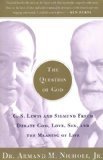
 by Dr. Armand M. Nicholi, Jr.
by Dr. Armand M. Nicholi, Jr.★★★★
A great book. I hated it.
This isn't really a "debate;" it's a biography of three men: the pre-conversion Lewis, and the post-conversion Lewis, and Freud. Nicholi does a great job of portraying both Lewis and Freud, perhaps two of the greatest minds of the last century.
Could any two men have needed religion more than Freud and Lewis? Both experienced suffering, as do we all. Freud was a noted atheist his entire life, yet the question of God continued to preoccupy him. Lewis was an atheist for the first third of his life, and writes "I was very angry with God for not existing. I was also equally angry with Him for creating a world ... why should creatures have the burden of existence forced on them without their consent."
One embraced Christianity, the other did not. One died contented, the other remained forever trapped in misery, powerless to do anything about a world view that offered little hope of happiness, longing for death yet greatly fearful of it. Freud finally chose to end his life by morphine injection.
Lewis' conversion brought inner quietness and tranquility. The book's author, Dr. Nicholi, is apparently a Christian; subtle hints throughout the book make clear his approval of Lewis' conversion to Christianity. Yet, whether Nicholi grasps this or not, his is not a book about choosing belief or unbelief. Freud and Lewis were both well-versed in the Bible. Freud could no more have chosen to believe than Lewis could have chosen unbelief. Experience, disposition, and impeccable logic developed the world view of both men.
As many of you know, I am a "liberal Christian;" I can no longer take the stories and promises of the Bible literally. By the end of Nicholi's book, I had no idea whether to rail at God for the unfairness of life or sneer at Lewis for succumbing to a fairy tale so as to distract himself from life's suffering.
One thing is clear: Lewis was happy.
(click picture to buy on Amazon)
Published on April 23, 2011 06:49
April 22, 2011
Book review: Biblical Archaeology Review
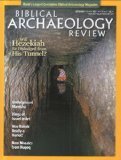
 ★★★★★
★★★★★Let me take a break from book reviews to plug my favorite magazine. Biblical Archaeology Review (BAR) is published bi-monthly, providing thought-provoking articles and touching on the latest biblical finds. I find it far from dry, enjoyable by laymen and hardened scholars both. BAR prides itself on objectivity, favoring neither believers nor unbelievers, but let's face it: history is secular, and controversial writing sells, so you're likely to find more controversy than inspiration. Yet, the scholarship shines, perhaps because any article's illogical conclusion is likely to be ripped apart by argumentative experts in the next issue.
The most recent issue (March/April 2011) features the following topics:
Jerusalem Roundup: An up-to-the-minute report on the archaeological activity in Jerusalem.
Solomon's Temple: Recent excavations of ancient Near Eastern temples shed light the structure of King Solomon's temple.
"Revolt" Coins: During the Jewish revolt in 66 CE, Herod's Temple Mount became a hub for rebel coin minting.
The Oxyrhynchus Papyri: You may have never heard of these priceless documents, discovered in Egypt over a century ago, portraying the beliefs and daily lives of ordinary Romans and Christians.
If you want your finger on the pulse of the latest thinking in Biblical studies and archaeology, this 'zine is a must.
Published on April 22, 2011 05:47
April 21, 2011
Joshua 6:20, The Battle of Jericho
So the people shouted when the priests blew with the trumpets: and it came to pass, when the people heard the sound of the trumpet, and the people shouted with a great shout, that the wall fell down flat, so that the people went up into the city, every man straight before him, and they took the city.
//In perhaps the most famous conquest of the Israelites, Jericho fell in miraculous fashion around the year 1200. For six days, Joshua's army marched around the city, parading the Ark of the Covenant and blowing their trumpets. On the seventh day, they trudged around the city seven more times, and as the trumpets blared one final time, the city walls came tumbling down.
This was the first battle Israel fought as it began its conquest of Canaan. The story goes that Israel destroyed every one of the enemy, both young and old, with all their animals, setting a precedence of utter genocide for battles yet to come. For this was the command of God, as they entered the promised land: [T]he LORD thy God shall deliver them before thee; thou shalt smite them, and utterly destroy them; thou shalt make no covenant with them, nor shew mercy unto them.
One wonders how Israel could honor such a heartless God? Had they learned nothing from 400 years of mistreatment in Egypt? Thankfully, the evidence argues against the biblical version. Archaeological data shows that the walls of Jericho were destroyed over 300 years before Joshua arrived. Jericho was first destroyed in about 2300 B.C., then rebuilt, and destroyed again by fire in the sixteenth century B.C. As archaeologist Bill Dever says, "if you want a miracle, here's your miracle: Joshua destroyed a city that wasn't even there."
//In perhaps the most famous conquest of the Israelites, Jericho fell in miraculous fashion around the year 1200. For six days, Joshua's army marched around the city, parading the Ark of the Covenant and blowing their trumpets. On the seventh day, they trudged around the city seven more times, and as the trumpets blared one final time, the city walls came tumbling down.
This was the first battle Israel fought as it began its conquest of Canaan. The story goes that Israel destroyed every one of the enemy, both young and old, with all their animals, setting a precedence of utter genocide for battles yet to come. For this was the command of God, as they entered the promised land: [T]he LORD thy God shall deliver them before thee; thou shalt smite them, and utterly destroy them; thou shalt make no covenant with them, nor shew mercy unto them.
One wonders how Israel could honor such a heartless God? Had they learned nothing from 400 years of mistreatment in Egypt? Thankfully, the evidence argues against the biblical version. Archaeological data shows that the walls of Jericho were destroyed over 300 years before Joshua arrived. Jericho was first destroyed in about 2300 B.C., then rebuilt, and destroyed again by fire in the sixteenth century B.C. As archaeologist Bill Dever says, "if you want a miracle, here's your miracle: Joshua destroyed a city that wasn't even there."
Published on April 21, 2011 06:37
April 20, 2011
Book review: Good Without God
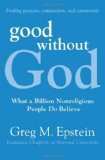
 by Greg M. Epstein
by Greg M. Epstein★★★★★
This is a book about Humanism, a "religion" that is badly misunderstood, trampled in Christian media as selfish. Epstein sets the record straight, articulating the beliefs he preaches as a Humanist chaplain. He points out that in our generation "we've successfully responded to the head of religion, but not to the heart of religion … we've produced a very heady atheism. But I believe in the heart of Humanism."
I can't call this an evangelical book, since Epstein stresses goodness over belief. He seems to care less about which religious setting we claim as our own, and more about our humanitarian practices. Epstein calls for a unified approach to human goodness, transcending religion. The real point of Humanism is that God is beside the point. Epstein seems to be no fan of the aggressive new atheism, and instead calls for atheists and agnostics to strive for religious literacy, while imploring religious people and Humanists to enter into a deeper dialogue and cooperation.
As such in this book, you will learn a great deal about the "religion" of Humanism. I continue to put quotations around the word "religion" because, while Humanism is a lifestyle and philosophy, it does not embrace the supernatural in any way. Faith is required, but not in any particular caricature of God, especially since (as Epstein points out more than once) the word "God" itself can mean pretty much anything we want in today's world.
Film writer/director Joss Whedon put it this way: "The enemy of Humanism is not faith—the enemy of Humanism is hate, it is fear, it is ignorance … But faith is something we have to embrace. Faith in God means believing absolutely in something, with no proof whatsoever. Faith in humanity means believing absolutely in something with a huge amount of proof to the contrary. We are the true believers."
Let me close with a poem by Yehuda Amichai that Epstein promotes as a sort of Humanist prayer:
Roshi, Roshi—when I banged my head on the doorWhen I banged my head on the door, I screamed,"My head, my head," and I screamed, "Door, door,"and I didn't scream "Mama" and I didn't scream "God."And I didn't prophesy a world at the End of Dayswhere there will be no more heads and doors.When you stroked my head, I whispered,"My head, my head," and I whispered, "Your hand, your hand,"and I didn't whisper "Mama" or "God."And I didn't have miraculous visionsof hands stroking heads in the heavensas they split wide open.Whatever I scream or say or whisper is onlyTo console myself: My head, my head.Door, door. Your hand, your hand.
(click picture to buy on Amazon)
Published on April 20, 2011 06:07
April 19, 2011
John 20:19-21, Shalom
On the evening of that first day of the week, when the disciples were together, with the doors locked for fear of the Jewish leaders, Jesus came and stood among them and said, "Peace be with you!" After he said this, he showed them his hands and side. The disciples were overjoyed when they saw the Lord. Again, Jesus said, "Peace be with you!"
//These words are spoken by the resurrected Jesus to his disciples. Luke agrees in his account: See Luke 24:36. The Matthew version is a bit different, perhaps because in Matthew, Jesus' message differs: "Do not suppose that I have come to bring peace to the earth. I did not come to bring peace, but a sword."
The message of peace is so important to John, however, that in the Fourth Gospel Jesus twice blesses the disciples with this promise. Why the double emphasis on the gift of peace?
Because peace implies the age of the Messiah. The Christ has arrived! His age-old greeting, "peace" or "shalom," was a wish of well-being, but between believers it came to mean the deeper, worldwide peace that God would grant in the age to come. In Ezekiel's famous dry-bones vision, God says to the army he revives, I will make a covenant of peace with them; it will be an everlasting covenant. I will establish them and increase their numbers, and I will put my sanctuary among them forever. My dwelling place will be with them; I will be their God, and they will be my people.
John's Gospel repeatedly preaches realized eschatology: The age has arrived. John does not look forward to an Armageddon to come. He repeatedly emphasizes Jesus as victor already over the world and the Devil. For this Gospel, at least, the age of peace has begun.
Would John be disappointed in the next 2,000 years?
//These words are spoken by the resurrected Jesus to his disciples. Luke agrees in his account: See Luke 24:36. The Matthew version is a bit different, perhaps because in Matthew, Jesus' message differs: "Do not suppose that I have come to bring peace to the earth. I did not come to bring peace, but a sword."
The message of peace is so important to John, however, that in the Fourth Gospel Jesus twice blesses the disciples with this promise. Why the double emphasis on the gift of peace?
Because peace implies the age of the Messiah. The Christ has arrived! His age-old greeting, "peace" or "shalom," was a wish of well-being, but between believers it came to mean the deeper, worldwide peace that God would grant in the age to come. In Ezekiel's famous dry-bones vision, God says to the army he revives, I will make a covenant of peace with them; it will be an everlasting covenant. I will establish them and increase their numbers, and I will put my sanctuary among them forever. My dwelling place will be with them; I will be their God, and they will be my people.
John's Gospel repeatedly preaches realized eschatology: The age has arrived. John does not look forward to an Armageddon to come. He repeatedly emphasizes Jesus as victor already over the world and the Devil. For this Gospel, at least, the age of peace has begun.
Would John be disappointed in the next 2,000 years?
Published on April 19, 2011 06:00
April 18, 2011
Book review: History and Christian Faith

 by Edward W. H. Vick
by Edward W. H. Vick★★★
From the back cover: "A basic Christian claim is that God is active in human history to accomplish his purpose, which he will do in the end. This book considers some of the implications of this far-reaching claim."
Readers looking for a quick and decisive argument either for or against God's participation in history will be disappointed. The book raises more questions than answers by introducing multiple issues and complexities. Christians, Vick points out, value honesty and should therefore welcome the means by which truth is to be arrived at. It is drilled into Christians at an early age that it is sinful to doubt, and this unquestioned reliability on the Bible's authority, coupled with a refusal to compromise the truths of Christianity, led to what came to be called fundamentalism.
Vick discusses the problem of historical analysis, pointing out that history is intrinsically secular. To establish an event historically is not the same as saying God acted in or through the event. Yet Christianity is a "historical religion," making absolute claims that God has acted directly in certain events of history.
Readers of the Bible may have found little tension in these claims until recent centuries. The development and acceptance of the scientific method distances us from those who lived before. For us to understand Bible writers, an effort at historical sympathy is necessary, but this, too, introduces conflict. And as if the scientific revolution weren't enough, the nineteenth century introduced a way of thinking about historical studies which we call the historical method, which, if followed rigorously, simply cannot address supernatural claims. God is left out in the cold.
Nevertheless, Vick gives us license to act as historians, encourages us to embrace today's scientific age, and helps us step out on a journey of discovery to verify our faith.
(click picture to buy on Amazon)
Published on April 18, 2011 06:41
April 17, 2011
Matthew 7:12, The Golden Rule
So in everything, do to others what you would have them do to you, for this sums up the Law and the Prophets. //If there is any universal teaching among religions, it is human respect and the Golden Rule. Today, let's celebrate our common denominator: Brahmanism: "This is the sum of duty: Do naught unto others which would cause you pain if done to you." Judaism: "What is hateful to you, do not to your fellow man. That is the entire Law; all the rest is commentary." Jainism: "The essence of right conduct is not to injure anyone." Taoism: "Regard your neighbor's gain as your own gain, and your neighbor's loss as our own loss." Islam: "No one of you is a believer until he desires for his brother that which he desires for himself." Buddhism: "Hurt not others in ways that you yourself would find hurtful." Confucianism: "Is there one maxim which ought to be acted upon throughout one's whole life? Surely it is the maxim of loving kindness: Do not unto others what you would not have them do unto you."
Published on April 17, 2011 08:08
April 16, 2011
Book review: The First Christmas
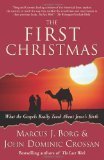 by Marcus J. Borg and John Dominic Crossan
by Marcus J. Borg and John Dominic Crossan ★★★★
Borg and Crossan collaborate again, this time to discuss the beginning of the Gospel story. I think this is a great partnership, as Borg softens and adds richness to Crossan's scholarship. The two play off each others' strengths. Nevertheless, I don't think this is their best effort; I enjoyed both The Last Week and The First Paul a bit more.
The Christmas Story, formed by splicing together two of the Bible's birth narratives, is a story of joy. (We all rightfully eschew the Bible's third birth story, the one in Revelation of a dragon waiting to devour the child of a heavenly woman.) Borg and Crossan want the joy within these parables to ring as you read. The Messiah is born! Behold God's glory!
Yes, they call them parables, or midrash, or anything but history, and point out the many contributing Hebrew themes and eschatological expectations behind the stories. The authors admit up front that "We are not concerned with the factuality of the birth stories. ... Our concern is neither to defend them as factual nor to trash them as nonfactual. Rather, we focus on their meanings."
While I thoroughly enjoyed reading its uplifting message, if the book had presented more new material, I would have been more pleased; as it was, I found it to be a bit of a rehash. There was one discussion, however, that I particularly enjoyed: how the issue of the factuality of the birth stories is recent, the product of just the last few hundred years. In earlier centuries, their factuality was not a concern for Christians. Rather, the truth of these stories, and the truth of the Bible as a whole (including factual truth) was taken for granted. It was simply "what everybody knew," and didn't require "belief." The authors help us step out of our enlightened age to understand Biblical thinking in a manner more helpful than I've encountered in this topic before.
This is a scholar's beach read. It was probably a quick write, and it's a quick read for those of you used to Crossan's detailed tomes, but I think you'll enjoy it.
(click picture to buy on Amazon)
Published on April 16, 2011 08:05



